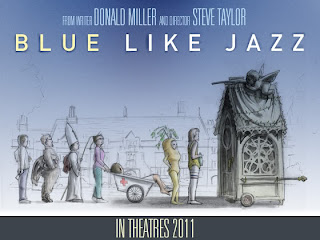Seven years ago, Don Miller wrote a spiritual-memoir titled “Blue Like Jazz” which eventually sold millions of copies. Don’s down-to-earth, bohemian life-style coupled with his breezy writing style attracted tons of young, Evangelical Christians. When I first began to take my faith seriously, “Blue Like Jazz” played a pivotal role in my understanding of God and the Christian life.
I recently reviewed Don’s latest book, “A Million Miles in a Thousand Years”, which explains how Don was asked to help produce a movie based on his bestselling memoir. Studying screenwriting and planning the “Blue Like Jazz” screenplay radically changed Don’s life. He began to see his life as a story guided by a Divine Author, allowing the principles of storytelling to shape his life into a ‘good story’.
Unfortunately, as of a few months ago, the production of the “Blue Like Jazz” film grounded to a halt. To the dismay of millions of fans, there would be no “Blue Like Jazz” movie due to lack of funds.
That was, however, until a couple of guys began a website and a campaign using the online funding platform Kickstarter to help save the movie. Fans quickly jumped on the bandwagon, and eventually the cause harnessed Facebook, Vimeo, Twitter, and blogs as well.
The campaign to save the “Blue Like Jazz” movie, which just ended yesterday, drew in 4,500 backers and raised more than $345,000. Don has already begun calling each donor individually to thank them, whether they donated $1 or $1,000, and donors were each given all sorts of incentives for donating any amount.
Collectively, these donors saved the movie.
This makes the “Blue Like Jazz” movie the largest crowd-sourced film in history.
The campaign exhibited the tremendous power of new media technology which waits to be fully harnessed. If you can unite that many people for a film, imagine what you could do for a nobler cause, like ending abortion or local hunger. Many mega-churches, both Catholic and Protestant, have hundreds of members themselves–how would their local communities respond if they used online micro-donations to campaign for their local poor?
Groups like Kiva have popularized small-business micro-loans to lift communities out of poverty and have made big changes in developing countries. In fact, one of the original innovators of micro-loan theory, Muhammad Yunus,was awarded the Nobel Peace Price for encouraging this very behavior.
Never before in history has it been easier to unite a mass group of people for a particular cause. Not during the Roman Empire. Not during the Crusades. Not during the Reformation. Not during the Revolutionary War.
Almost no leader in history has had more networking power than you do with a Facebook account or blog.
Through this digital revolution, God has given us some powerful tools to change the world for the better. May we choose to use them well!

